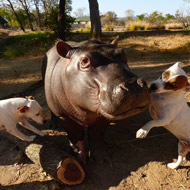
TV star 'Douglas' begins his return to the wild in the South Luangwa river
The Born Free Foundation have announced that an orphaned baby hippo, who captured the hearts of the nation after he appeared on ITV1's "Paul O'Grady's Animal Orphans", has been successfully released back into the wild.
The hippo, named Douglas, was just two weeks old and close to death when he was rescued. He appeared on the ITV programme making friends with terriers Molly and Coco as he started an ambitious rehabilitation programme at the Chipembele Wildlife Education Trust (CWET). Douglas has now joined a pod of wild hippos in the nearby South Luangwa River.
Will Travers, president of the Born Free Foundation, which supports CWET, said of the rescue mission: “I’m so pleased to be able to say ‘Mission Accomplished’ for Douglas! Born Free believes that the individual animal matters – every wild animal deserves a life worth living and to be free. And today, thanks to the work of our dedicated partners on the ground in Zambia, we know there is one happy wild hippo living free again.”
Anna and Mr Tolan, who established CWET, said that this was the first time they'd taken in a hippo in over 16 years.
Describing the effort, Steve Tolan said: “We constructed a pool and brought in dedicated carers to look after Douglas who initially was bottle fed and looked to his human carers for reassurance and companionship and even swimming lessons, but we urgently needed financial support.
"Luckily Douglas’ story touched many people and in particular we want to thank the supporters of Born Free Foundation who adopted Douglas and have, over the past 12 months provided over £10,000, helping make Douglas’ rehabilitation and release a reality.
"Douglas has now been fending for himself since he was weaned in January and is surviving and thriving. He has made his first few attempts to join the wild pod in the Luangwa River. It will probably be a long, slow process until he is fully accepted into the pod but he is on his way.”
Image (c) The Born Free Foundation



 The Animal and Plant Health Agency (APHA) has updated its online reporting service for dead wild birds.
The Animal and Plant Health Agency (APHA) has updated its online reporting service for dead wild birds.